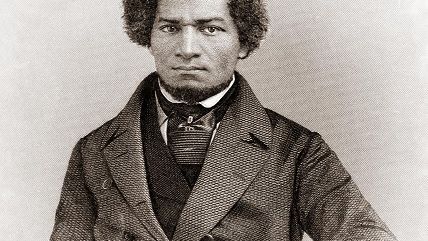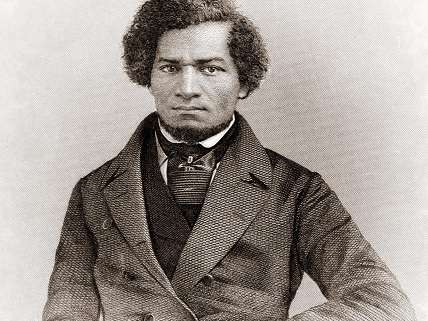No, Salon, There's No Reason to Think Frederick Douglass Would Agree With You on Banning the Confederate Flag as Hate Speech
Racist?


Over at Salon, Nick Bromell argues that the Confederate (battle) flag is a symbol of nothing but "pure hatred" that all Americans should recoil in horror from. Bromell quotes heavily from Frederick Douglass, who warned during and after the Civil War that the malignant racism that contributed to that conflict hadn't ended in America. The massacre at a black church in South Carolina by a white supremacist, for Bromell, proves that that "pestilence" hadn't abated yet—that little has changed. Never mind the reaction to the massacre—universal outrage and condemnation coupled with the taking down of the Confederate banner not just at the South Carolina state capitol and at other state capitols in the South but from online shopping sites , TV reruns, and even, briefly, video games.
In making the argument that the U.S. ought to ban the Confederate flag as hate speech, Bromell doesn't mention the First Amendment but does say he feels confident Frederick Douglass would agree. The First Amendment and the Confederate battle flag, of course, both existed when Douglass was alive. Racists in the South were already adopting specific symbols to broadcast their beliefs. There's no record of Douglass calling for any of these emerging symbols to be banned.
More importantly, there's no evidence Frederick Douglass had as wishy-washy and relativist attitude toward the First Amendment and free speech as many liberals today do. In 1860, Frederick Douglass made a "plea for free speech" in Boston after some Northern "gentlemen" broke up an abolitionist meeting. Unpopular ideas deserve protections of free speech too, argued Douglass, and that they applied to all people not just "a particular description of persons."
To Douglass, the right to free speech was a "sacred" right, one that filled tyrants with dread, with horror. "There can be no right of speech," Douglass argued, "where any man, however lifted up, or however humble, however young, or however old, is overawed by force, and compelled to suppress his honest sentiments." It shouldn't be surprising for people who understand Douglass valued liberty as a principle and ideal and not just as an ends for himself.
Related: A reminder about free speech for Bromell and other partisans, on the left and right, who don't yet understand how that deceptively simple concept works.


Show Comments (115)